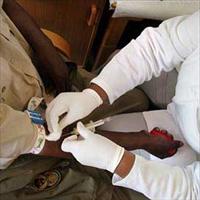KENYA: Blood donors encouraged to learn HIV status

Blood donation drives held in Kenya in recent weeks to meet the need created by post-election violence have highlighted the shortage of regular blood donors and the problem this creates in public healthcare, say officials from the national blood transfusion service.
"We realise people have a lack of confidence in their health status that generates the fear to donate blood," said Stranslaus Onyango, assistant programme officer at Hope Worldwide Kenya, an international faith-based organisation, which partners with the Ministry of Health in mobilising blood donations.
Onyango explained that blood donations have to be screened for HIV to ensure they are safe for transfusion, and that many people do not donate because they are afraid of learning their HIV status.
Kenya requires more than 200,000 pints of blood annually, but was only able to raise 130,000 pints in 2007. Tim Odongo, national blood recruiter at the Ministry of Health, told IRIN/PlusNews that after the United States embassy was bombed in 1998, hospitals were so short of blood they had to import stocks from Israel.
In an effort to fill the nation's blood banks, the National Blood Transfusion Service has started a 'retention and prevention' programme inviting Kenyans to be tested for HIV and to become regular blood donors.
"To encourage current and potential donors to commit to regular voluntary blood donation, we are encouraging individuals to check on their status first," Onyango said. "Knowledge is power, and choosing not to find out about your status is putting off the issue to a later date and not dealing with it. This programme aims to encourage the youth to participate in donating blood, with an emphasis on remaining negative."
He said about 10 percent of the 80 pints of blood collected during an average one-day blood drive usually had to be incinerated because of the presence of HIV, syphilis or hepatitis B or C.
The new programme encourages clubs to be set up, where regular blood donors can meet, share their experiences and help motivate other people to join and become donors. The national blood bank is also using text messages to urge previous donors to come back, and offering them incentives in the form of certificates after each donation.
"We have been keen on educating the general public on blood donation by reaching out to groups such as churches and learning institutions," said the health ministry's Odongo. "We educate to eliminate [myths] such as that HIV can be contracted from [using] recycled needles [when donating blood]."
 Back and Next - Back and Next
Back and Next - Back and Next See Also - See Also
See Also - See Also